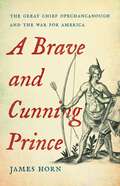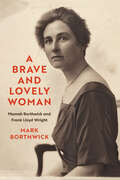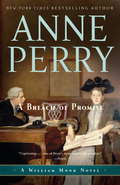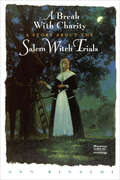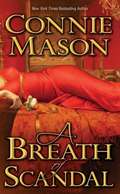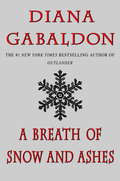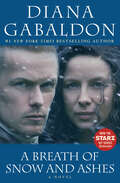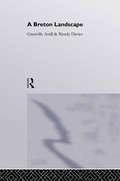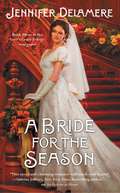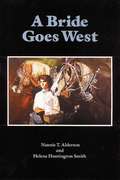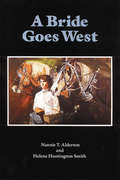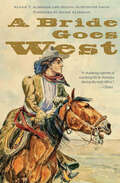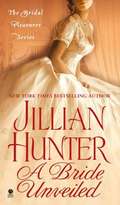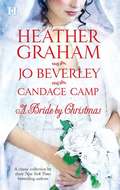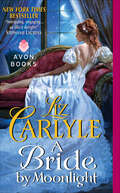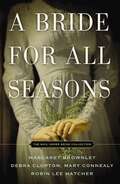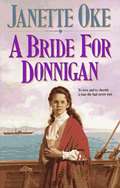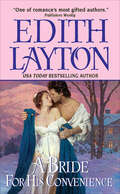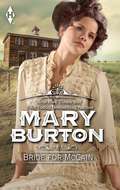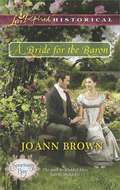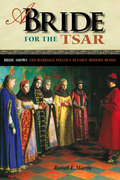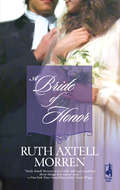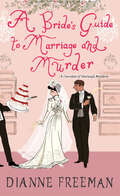- Table View
- List View
A Brave and Cunning Prince: The Great Chief Opechancanough and the War for America
by James HornThe extraordinary story of the Powhatan chief who waged a lifelong struggle to drive European settlers from his homelandIn the mid-sixteenth century, Spanish explorers in the Chesapeake Bay kidnapped an Indian child and took him back to Spain and subsequently to Mexico. The boy converted to Catholicism and after nearly a decade was able to return to his land with a group of Jesuits to establish a mission. Shortly after arriving, he organized a war party that killed them.In the years that followed, Opechancanough (as the English called him), helped establish the most powerful chiefdom in the mid-Atlantic region. When English settlers founded Virginia in 1607, he fought tirelessly to drive them away, leading to a series of wars that spanned the next forty years—the first Anglo-Indian wars in America— and came close to destroying the colony.A Brave and Cunning Prince is the first book to chronicle the life of this remarkable chief, exploring his early experiences of European society and his long struggle to save his people from conquest.
A Brave and Lovely Woman: Mamah Borthwick and Frank Lloyd Wright
by Mark BorthwickMamah Borthwick was an energetic, intelligent, and charismatic woman who earned a master’s degree at a time when few women even attended college, translated writings by a key figure of the early feminist movement, and taught at one of Germany’s best schools for boys. She is best known, however, as the mistress of the famous American architect Frank Lloyd Wright, and for her shocking murder at the renowned Wisconsin home he built for her, Taliesin. A Brave and Lovely Woman offers an important corrective to the narrative of Wright and Borthwick, a love story as American in character as it is Shakespearean in conclusion. Little of Wright’s life and work has been left untouched by his many admirers, critics, and biographers. And yet the woman who stood at the center of his emotional life, Mamah Borthwick, has fallen into near obscurity. Mark Borthwick—a distant relative—recenters Mamah Borthwick in her own life, presenting a detailed portrait of a fascinating woman, a complicated figure who was at once a dedicated mother and a faithless spouse, a feminist and a member of a conservative sorority, a vivacious extrovert and a social pariah. Careful research and engaging prose at last give Borthwick, an obscure but crucial character in one of America’s most famous tragedies, center stage.
A Breach of Promise: A William Monk Novel (William Monk #9)
by Anne PerryIn a sensational breach-of-promise suit, two wealthy social climbers are suing on behalf of their beautiful daughter, Zillah. The defendant is Zillah's alleged fiancé, brilliant young architect Killian Melville, who adamantly declares that he will not,cannot, marry her. Utterly baffled by his client's refusal, Melville's counsel, Sir Oliver Rathbone, turns to his old comrades in crime--William Monk and nurse Hester Latterly. But even as they scout London for clues, the case suddenly and tragically ends, in an outcome that no one--except a ruthless murderer--could have foreseen.e investigator who knows his city like the back of his hand, and fearless nurse Hester Latterly. But even as they scout London for clues, from Mayfair to sordid Devil's Acre, the case suddenly and tragically ends. An outcome that no one--except a ruthless murderer--could have foreseen.Stripping away the pretty masks that conceal society's darkest transgressions, Anne Perry unflinchingly exposes the human heart's deepest hiding places--and creates the most mesmerizing courtroom drama of her distinguished career.From the Hardcover edition.
A Break in the Future: Feeling Like an Activist After the Arab Uprisings
by Fuad MusallamInvestigates how Lebanese activists work through failure to keep the possibility of political change aliveA Break in the Future considers how activists keep hope alive and work toward future change when social movements fall apart and protests fail. Anthropologist Fuad Musallam investigates the endurance of political possibility in Beirut, Lebanon, between the Arab uprisings of 2010–11 and the Lebanese uprising of October 2019. Despite a regional collapse of political hope and a local inability to effect change in the context of political stasis, postponed elections, and the degradation of civil infrastructure, between every protest cycle a sizable number of people remained engaged and built toward future political opportunities. Through an analysis of activist strategies, Musallam explores the ways in which we grasp different phases of political (dis)engagement together. The book is motivated by a desire to better understand how to keep political possibility alive.To make sense of how possibility endures, this book looks at the ebb and flow of political engagement together, that is, not only at the peaks of recent mobilizations but also at the times in between when, at first glance, little seems to be happening on the ground. Musallam explores how activists cultivated and maintained their political subjectivity—the active and engaged sense of self that motivates political action—across the decade’s high and low points. He finds this political subjectivity to be the product of heartbreak and defeat as much as victory, as it underlies several movements at any one time and can sustain activists through multiple setbacks.Musallam discovers that when political change seems most unlikely, a moment of rupture—or a “break in the future”—becomes central to Lebanese activists’ belief that their actions can and will transform their world. A Break in the Future ultimately argues that the experience of moments of rupture radically transforms what seems possible, and that the cultivation of these experiences keeps movements going even when things appear to fall apart.
A Break with Charity: A Story about the Salem Witch Trials (Great Episodes Ser.)
by Ann RinaldiSusanna English desperately wants to join the circle of girls who meet every week at the parsonage, but she doesn&’t realize the leader of the group, the malicious Ann Putnam, is about to set off a torrent of false accusations that will lead to the imprisonment and execution of countless innocent people—victims of a witch-hunt panic. &“The author&’s skillful manipulation of the conventions of the young-adult novel—particularly the rich exploration of being an outsider and going against the mainstream—makes this book a superb vehicle for examining the social dynamics of this legendary event.&” —The Horn Book
A Breath of Scandal
by Connie MasonJulian, the notorious Scorpion, is spying for the crown when the Jackal shoots him and leaves him for dead. Lara, the half-Gypsy daughter of an earl, finds him and saves him by marrying him according to Gypsy law. Through much intrigue and action, they try to claim the truth in their own hearts.
A Breath of Snow and Ashes (Outlander #6)
by Diana GabaldonEagerly anticipated by her legions of fans, this sixth novel in Diana Gabaldon’s bestselling Outlander saga is a masterpiece of historical fiction from one of the most popular authors of our time.Since the initial publication of Outlander fifteen years ago, Diana Gabaldon’s New York Times bestselling saga has won the hearts of readers the world over — and sold more than twelve million books. Now, A Breath of Snow and Ashes continues the extraordinary story of 18th-century Scotsman Jamie Fraser and his 20th-century wife, Claire.The year is 1772, and on the eve of the American Revolution, the long fuse of rebellion has already been lit. Men lie dead in the streets of Boston, and in the backwoods of North Carolina, isolated cabins burn in the forest.With chaos brewing, the governor calls upon Jamie Fraser to unite the backcountry and safeguard the colony for King and Crown. But from his wife Jamie knows that three years hence the shot heard round the world will be fired, and the result will be independence — with those loyal to the King either dead or in exile. And there is also the matter of a tiny clipping from The Wilmington Gazette, dated 1776, which reports Jamie’s death, along with his kin. For once, he hopes, his time-traveling family may be wrong about the future.From the Hardcover edition.
A Breath of Snow and Ashes: The Companion To The Fiery Cross, A Breath Of Snow And Ashes, An Echo In The Bone, And Written In My Own Heart's Blood (Outlander #6)
by Diana GabaldonEagerly anticipated by her legions of fans, this sixth novel in Diana Gabaldon's bestselling Outlander saga is a masterpiece of historical fiction from one of the most popular authors of our time. Since the initial publication ofOutlanderfifteen years ago, Diana Gabaldon'sNew York Timesbestselling saga has won the hearts of readers the world over -- and sold more than twelve million books. Now,A Breath of Snow and Ashescontinues the extraordinary story of 18th-century Scotsman Jamie Fraser and his 20th-century wife, Claire. The year is 1772, and on the eve of the American Revolution, the long fuse of rebellion has already been lit. Men lie dead in the streets of Boston, and in the backwoods of North Carolina, isolated cabins burn in the forest. With chaos brewing, the governor calls upon Jamie Fraser to unite the backcountry and safeguard the colony for King and Crown. But from his wife Jamie knows that three years hence the shot heard round the world will be fired, and the result will be independence -- with those loyal to the King either dead or in exile. And there is also the matter of a tiny clipping fromThe Wilmington Gazette, dated 1776, which reports Jamie's death, along with his kin. For once, he hopes, his time-traveling family may be wrong about the future. From the Hardcover edition.
A Breton Landscape: From The Romans To The Second Empire In Eastern Brittany
by Wendy Davies Prof Wendy *Nfa* Dr Grenville Astill Grenville AstillFirst Published in 1997. Routledge is an imprint of Taylor & Francis, an informa company.
A Bride For The Season (Love's Grace #3)
by Jennifer DelamereThe third book in Jennifer Delamere's inspirational Love's Grace trilogy. Readers of both mainstream historical romance and inspirational romance will be swept away by Delamere's emotionally-wrenching and passionate tale.
A Bride Goes West
by Nannie T. Alderson Helena H. SmithA Bride Goes West is new and fresh because it is impregnated with a just sense of values about life. When Nannie Tiffany of West Virginia married Walt Alderson, who'd already been on the cattle trail for years, in 1882, they went to Montana to start a little ranch. There's plenty about ranching in this book but what is most valuable is about life, about people in this ranch country.
A Bride Goes West
by Nannie T. Alderson Helena Huntington SmithA Bride Goes West is new and fresh because it is impregnated with a just sense of values about life. When Nannie Tiffany of West Virginia married Walt Alderson, who'd already been on the cattle trail for years, in 1882, they went to Montana to start a little ranch. There's plenty about ranching in this book but what is most valuable is about life, about people in this ranch country.
A Bride Goes West (Bison Classic Editions)
by Nannie T. Alderson Helena Huntington SmithBlizzards, droughts, predators, unpredictable markets, and a host of other calamities tell the history of the daily struggles of Western ranching, and perhaps no one has told the story better than Nannie T. Alderson, a transplanted southern woman who married a cowboy and found herself in eastern Montana trying to build a ranching business a one-hundred-mile horse-and-buggy ride from the nearest town. Unfamiliar with even the most basic household chores, she soon found herself washing, cooking, riding, cleaning, branding, and a host of other ranch activities for which her upbringing had not prepared her. Although Nannie Alderson and her husband, Walt, would eventually move to Miles City, her story of the rigors of ranch life serves as the preeminent account of Montana ranch life and culture. This edition features a foreword from Nannie&’s great-grandniece, Jeanie Alderson, who ranches in the same area.
A Bride Unveiled
by Jillian HunterIn the second installment of New York Times bestselling author Jillian Hunter's Bridal Pleasures series, the flames of a forbidden love are reignited when Miss Violet Knowlton reunites with a childhood friend.
A Bride by Christmas: Home For Christmas, The Wise Virgin, Tumbleweed Christmas
by Heather Graham Jo Beverley Candace CampHome For Christmas It broke Travis's heart to see Isabelle go, but he was the Yankee captain who had commandeered her home and she was a daughter of the Confederacy. Yet even in the war-torn South, there was room for a Christmas miracle or two. The Wise Virgin Their families have feuded for generations. But will the love of Edmund de Grave and Joan Montelan overcome all this Christmas Eve-or will a family secret keep them apart forever? Tumbleweed Christmas Rancher Daniel MacKenzie met his match in his new housekeeper, Melinda Ballard. She was determined to bring the holiday spirit into his home-and the magic of love into his heart.
A Bride by Moonlight (Fraternitas Aureae Crucis #8)
by Liz CarlyleFourth in the Victorian romance series from the New York Times-bestselling author who sets up “sizzling encounters . . . [and] keeps the reader guessing” (Historical Novel Society).Passion and secrets simmer behind the elegant façade of Victorian London in A Bride by Moonlight, another deliciously intriguing romance by Liz Carlyle that features the dangerous men of the mysterious St. James Society.Faced with murder charges, Lisette Colburne never imagined aligning herself with Scotland Yard—not with the scandalous life she’s led. But when Commissioner Royden Napier proposes—that in exchange for her freedom—she pretend to be his wife so he can unravel a brutal mystery, she agrees. What neither counts on is their intoxicating, undeniable attraction.Sexy and action-packed, Liz Carlyle’s A Bride by Moonlight is a beautiful love story set in Victorian high society with compelling characters and elegant, emotional prose that will appeal to readers of historical romance.Praise for the Fraternitas Aureae Crucis series“Intriguing . . . engaging . . . an illicit delight.” —Stephanie Laurens, #1 New York Times–bestselling author “Liz Carlyle weaves passion and intrigue with a master’s touch.” —Karen Robards, New York Times–bestselling author
A Bride for All Seasons: The Mail Order Bride Collection
by Debra Clopton Margaret Brownley Mary Connealy Robin HatcherIt all started with an ad in a mail-order bride catalogue . . .This charming bouquet of novellas introduces you to four Hitching Post Mail-Order Bride Catalogue prospects in the year 1870, all eager for second chances . . . and hungry for happiness. Year in, year out, they'll learn that love often comes in unexpected packages."And then Came Spring" by Margaret BrownleyMary-Jo has traveled halfway across the country to meet her match, arriving just in time for his funeral. Returning home seems like her only option until her would-be brother-in-law proposes a more daring idea."An Ever After Summer" by Debra CloptonEllie had no idea she's not what Matthew ordered. And what's wrong with being a "Bible thumper" anyway? She's determined to show him she's tougher than she looks--and just the girl he needs."Autumn's Angel" by Robin Lee HatcherLuvena would be perfect for Clay if she didn't come with kids. But kids are a deal breaker, especially in a rough-and-trouble mining town. e trouble is, there's no money to send them back . . . "Winter Wedding Bells" by Mary ConnealyDavid's convinced he's not long for the world. He needs someone to mother his boys when he's gone--nothing more. Can plucky Irish Megan convince him to work at living instead of dying?
A Bride for Christmas
by Brenda Minton Jill KemererComing home for ChristmasThe Rancher's Mistletoe Bride by Jill Kemerer Wedding planner Lexi Harrington needs a manager for her inherited Wyoming ranch. Clint Romine would be the perfect man for the job, if the ruggedly handsome cowboy wasn&’t such a distraction. For former foster kid Clint, opening up to Lexi means revealing a secret that could jeopardize everything he holds dear. This Christmas, can Clint learn to trust Lexi with the truth…and with his heart?The Rancher's Christmas Bride by Brenda Minton After she was jilted at the altar, fleeing to Bluebonnet Springs to care for her ailing grandfather seems like the perfect solution for Marissa Walker. When her limo breaks down, neighboring rancher Alex Palermo comes to her rescue. Alex can&’t turn his back on the spirited city girl, and soon his priority becomes convincing her to stay. Because Christmas—and his future—would be much merrier with Marissa by his side. :2 Uplifting Stories The Rancher's Mistletoe Bride and The Rancher's Christmas Bride
A Bride for Donnigan (Women of the West #7)
by Janette OkeKathleen crosses the ocean from London to meet the man who paid for her passage and the man she was to marry. She left a life full of troubles and grief to enter a life of the unknown. Long synopsis: Responding to an Advertisement, She Crossed an Ocean to Meet a Total Stranger and Became a Mail-Order Bride.... Kathleen O'Malley stood on the deck of the Baireth Lily and watched the land she'd called home for more than a dozen years slip from her view. She had thought she would be glad to see the last of it, but she was not. Emotions in turmoil, her whole being yearned to slip from the ship and return to what she knew. Even though Kathleen had not been happy with her situation, it was all she had ever known. As the shoreline faded into the morning mist, her only certainty was that she was bound for America to marry a man whose name she did not even know and whose face she had never seen. On the other side of the Atlantic, Donnigan Harrison anxiously awaits Kathleen's arrival on a prairie farm far from her port of arrival in Boston. He has known the wonder of a dream fulfilled-a snug frame cabin, the sturdy log barn and outbuildings, a fine herd of livestock, and crops in the field that made his eyes sparkle. Yet Donnigan felt a loneliness on the western frontier that pierced his very soul. With so limited opportunities for finding a wife, the notion of ordering a wife that once seemed unthinkable had come to make some sense. Now that the time has come, Donnigan feels like a small boy waiting for Christmas. But Donnigan's anticipation is overshadowed with terrifying uncertainties-What have I done! And that question is echoed in Kathleen's heart as she nears the point of no return.
A Bride for His Convenience
by Edith LaytonUnless he finds a wealthy wife—and soon—Lord Ian Sutcombe will lose everything. Left deeply in debt by his foolish father and greedy stepmother, his only hope is to marry for money. Stung by a suitor’s cruel betrayal, Hannah Leeds, daughter of a prosperous merchant, wasn’t sure she’d ever love again. So when her father arranges her betrothal to the handsome lord, she agrees.It was no more than a marriage of convenience. They would honor and obey, but never love…until a simmering passion exploded into a sizzling affair. Now, with Hannah socializing with members of the ton and another man out to win her heart, Ian will do everything in his power to show Hannah she is his ecstasy, his desire fulfilled…and ho so much more than a bride for his convenience.
A Bride for McCain
by Mary BurtonRoss has his pride...Ross McCain is determined to bring a schoolteacher to town, even if he has to carry her all the way out West. But he's not anticipated Miss Grimes being so hard to live with-or that he'd wind up proposing to her just to keep her from leaving!Jessica has a secret...Forced to flee Sacramento, posing as a schoolteacher, Jessica Tierney is out of her depth. She knows nothing of country living, let alone children! And now rancher Ross McCain is insisting that they marry. But how can she let their marriage be based on a lie-especially when she discovers she's falling in love with him?
A Bride for the Baron
by Jo Ann BrownA Man Beyond Her Reach Vera Fenwick is everything a vicar's sister should be-helpful, modest and sensible. She knows the perils of falling for a man above her station, but it does no harm to admire Edmund Herriott, Lord Meriweather-from afar. She's perfectly content to help him restore the local rectory...and she's much too reasonable to risk her heart. Working alongside Vera to rebuild the church and foil a smuggling ring is restoring the confidence Edmund lost in battle. Vera may be sure she's not suited to be an aristocrat's wife, but Edmund is utterly confident of one thing-that this unexpected love was built to last. Sanctuary Bay: Where three war heroes find the healing power of love
A Bride for the Tsar: Bride-Shows and Marriage Politics in Early Modern Russia (NIU Series in Slavic, East European, and Eurasian Studies)
by Russell MartinFrom 1505 to 1689, Russias tsars chose their wives through an elaborate ritual: the bride-show. The realms most beautiful young maidens—provided they hailed from the aristocracy—gathered in Moscow, where the tsars trusted boyars reviewed their medical histories, evaluated their spiritual qualities, noted their physical appearances, and confirmed their virtue. Those who passed muster were presented to the tsar, who inspected the candidates one by one—usually without speaking to any of them—and chose one to be immediately escorted to the Kremlin to prepare for her wedding and new life as the tsars consort. Alongside accounts of sordid boyar plots against brides, the multiple marriages of Ivan the Terrible, and the fascinating spectacle of the bride-show ritual, A Bride for the Tsar offers an analysis of the shows role in the complex politics of royal marriage in early modern Russia. Russell E. Martin argues that the nature of the rituals surrounding the selection of a bride for the tsar tells us much about the extent of his power, revealing it to be limited and collaborative, not autocratic. Extracting the bride-show from relative obscurity, Martin persuasively establishes it as an essential element of the tsarist political system.
A Bride of Honor
by Ruth Axtell MorrenDamien Hathaway is entranced from the moment he sees Miss Lindsay Phillips walk into his church. Although she's betrothed to a gentleman of the "ton," Damien is determined to find the pure heart he's sure exists underneath all the ruffles and lace. Original.
A Bride's Guide to Marriage and Murder: A Brilliant Victorian Historical Mystery (A Countess of Harleigh Mystery #5)
by Dianne FreemanFrances Wynn, the American-born Countess of Harleigh, returns in Dianne Freeman&’s charming, lighthearted mystery series set in Victorian England, and finds her wedding day overshadowed by murder . . . On the eve of her marriage to George Hazelton, Frances has a great deal more on her mind than flowers and seating arrangements. The Connors and the Bainbridges, two families of American robber barons, have taken up residence in London, and their bitter rivalry is spilling over into the highest social circles. At the request of her brother, Alonzo, who is quite taken with Miss Madeline Connor, Frances has invited the Connor family to her wedding. Meanwhile, Frances&’s mother has invited Mr. Bainbridge, and Frances fears the wedding may end up being newspaper-worthy for all the wrong reasons. On the day itself, Frances is relieved to note that Madeline&’s father is not among the guests assembled at the church. The reason for his absence, however, turns out to be most unfortunate: Mr. Connor is found murdered in his home. More shocking still, Alonzo is caught at the scene, holding the murder weapon. Powerful and ruthless, Connor appears to have amassed a wealth of enemies alongside his fortune. Frances and George agree to put their wedding trip on hold to try and clear Alonzo&’s name. But there are secrets to sift through, not just in the Bainbridge and Connor families, but also in their own. And with a killer determined to evade discovery at any cost—even if it means taking another life—Frances&’s first days as a newlywed will be perilous indeed . . .
